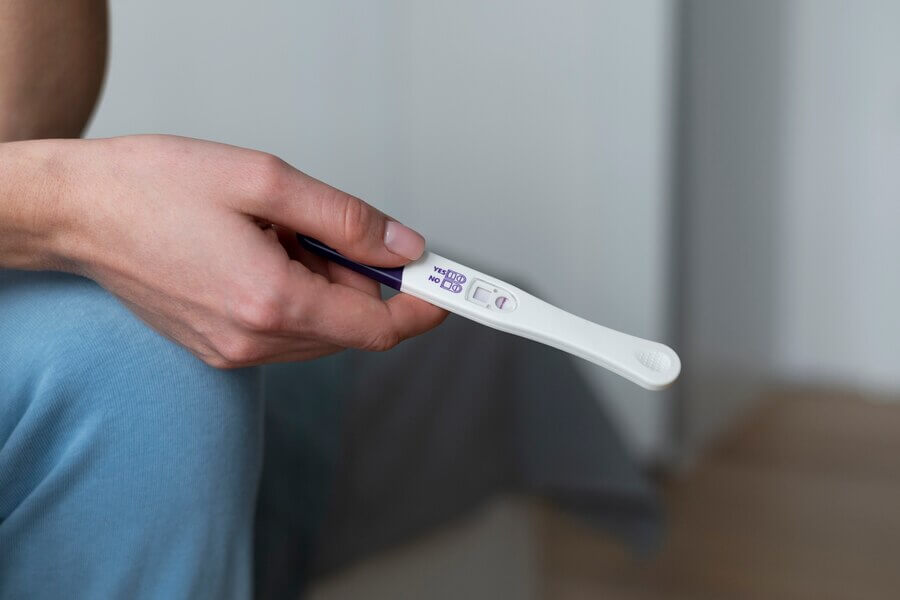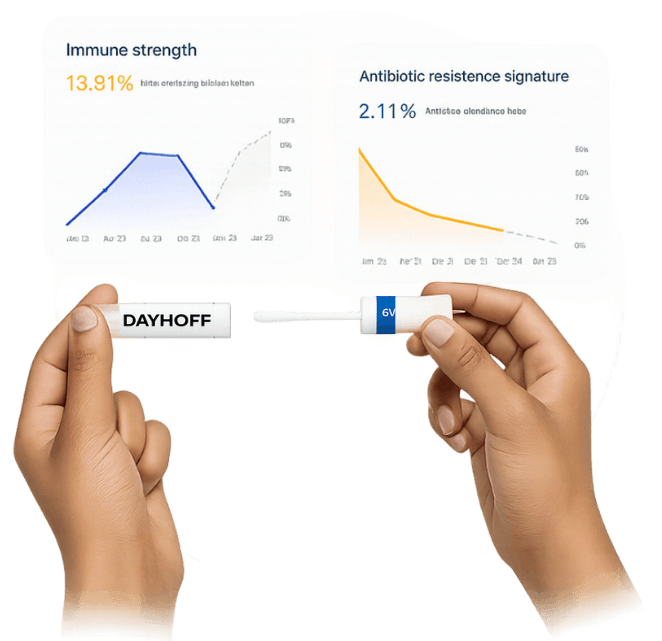Approximately 19–26% of women experience challenges related to reproductive and fertility health. Of those affected by infertility, around 12% turn to assisted reproductive treatments such as in vitro fertilization (IVF), resulting in an estimated 400,000 IVF cycles performed annually in the U.S.
Recent research suggests that the gut microbiome may play a role in key pregnancy outcomes, including complications like gestational diabetes, preterm labor, and preeclampsia. These insights have sparked growing interest in how gut health might influence fertility and IVF success.
This study, conducted by Dayhoff is designed to investigate how the gut microbiome may impact IVF outcomes. Adults currently undergoing IVF who purchase a Dayhoff gut microbiome test may choose to participate by consenting to share their anonymized data. Participants will also be asked to complete a brief follow-up survey after implantation outcomes are known.


Dayhoff integrates cutting-edge data science, deep learning, and a robust bioinformatics repository to advance personalized medicine. From families seeking actionable health insights to research labs exploring intricate datasets, our patented technology and expert partnerships deliver transformative results.
This study is open to individuals who have purchased a Dayhoff Gut Health Test.
To see if you qualify, please complete the short eligibility survey linked on this page.
If you are eligible, you will receive a link to purchase a Research Edition Dayhoff Gut Health Test at a discounted rate.
To help investigate the connection between gut health and IVF success, participants must agree to complete a brief follow-up survey approximately 4–8 weeks after embryo transfer to share pregnancy outcomes.
Samples can be collected easily at home using our swab method and mailed back in the prepaid envelope included in your kit.
You will be asked to complete health history and sample-related surveys during the process.
About the Test
Processed in a CLIA-certified lab using proprietary technology, Dayhoff’s Gut Health Test provides strain-level precision and a comprehensive list of microbes in your gut microbiome, including bacteria, fungi, viruses, parasites, and archaea. Results are typically available within 4–5 weeks.
This research edition is intended for individuals currently undergoing IVF treatment at a clinic (supporting documentation required).
Participants must:
Each report includes key insights and microbiome metrics, reviewed by Dayhoff’s team of microbiome experts.
Dayhoff also offers personalized, evidence-based recommendations tailored for those trying to conceive, currently pregnant, or postpartum.
Please note: The microbiome report and action plan are part of Dayhoff’s standard Gut Health Test and are not exclusive to the research study.
To support this research, it is important that participants complete the follow-up pregnancy outcome survey after embryo transfer.
If you’ve consented to the study, you will receive a secure link to this follow-up survey via email.
Data exposure:
Dayhoff will collect personal information such as your name, email, address, and relevant health details through online surveys. While the risk of personal information or microbiome data being exposed is low, it is still a possibility.
To protect your privacy, all personal data is stored in encrypted databases with access restricted to authorized employees who use dual authentication. Stool samples are de-identified with a unique kit ID before being sent to partner laboratories for DNA extraction and sequencing.
While microbiome testing cannot diagnose fertility factors, it can help reveal associations between your gut microbiome and overall health that may be relevant to fertility.
How this works:
We analyze the relative abundance of key gut bacteria that have been identified through scientific research as important indicators of microbiome balance. The Dayhoff Bioinformatics Pipeline uses a custom-built database of over 120,000 complete microbial genomes. Our process involves reviewing current research on the microbiome and applying these insights to highlight bacteria that may play a role in overall health.
It’s important to note that, beyond the gut microbiome, many other factors can influence fertility outcomes.
For the purposes of this study, gut samples must be collected within 3 months before embryo transfer.
The study will run until June 2025, so if you are not yet within that timeframe, you are welcome to return once you qualify to access the Research Edition discounted kit.